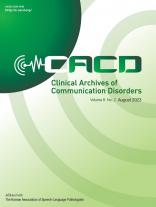Aging Effects and Working Memory in Garden-Path Recovery
- 한국언어재활사협회
- Clinical Archives of Communication Disorders
- Vol.2 No.2
-
2017.0891 - 102 (12 pages)
- 6

Purpose: The relationship between working memory (WM) and sentence comprehension (SC) has drawn many researchers’ attention. The current study examined whether healthy older adults have difficulty comprehending potentially WM-demanding garden-path sentences involving syntactic ambiguities, and whether their comprehension is predicted by their working memory capacity or inhibitory control. Methods: Older adults (n=35, ages 60–89) and younger adults (n=36, ages 19–33) completed two self-paced reading experiments and a battery of cognitive measures (working memory and inhibition tasks). Participants read the sentences containing a Minimal Attachment (MA) ambiguity in Experiment 1 and a Late Closure (LC) ambiguity in Experiment 2. Results: The older adults’ garden-path effect was larger than younger adults’ in on-line measures. However, older adults exhibited higher off-line acceptability judgments for garden-path sentences than younger adults, for both LC and MA sentences. Working memory predicted off-line performance of both younger and older groups in Experiment 2 (LC). Conclusions: The results showed age-related differences in the comprehension of sentences with temporary syntactic ambiguities. Successful recovery from garden paths (revealed by off-line measures) was predicted by working memory. However, the source of age-related differences in real-time processing remains unclear. These results indicate that healthy aging can affect comprehension of challenging, syntactically ambiguous material.
INTRODUCTION
METHODS, EXPERIMENTS 1-2
RESULTS
DISCUSSION
CONCLUSIONS
(0)
(0)